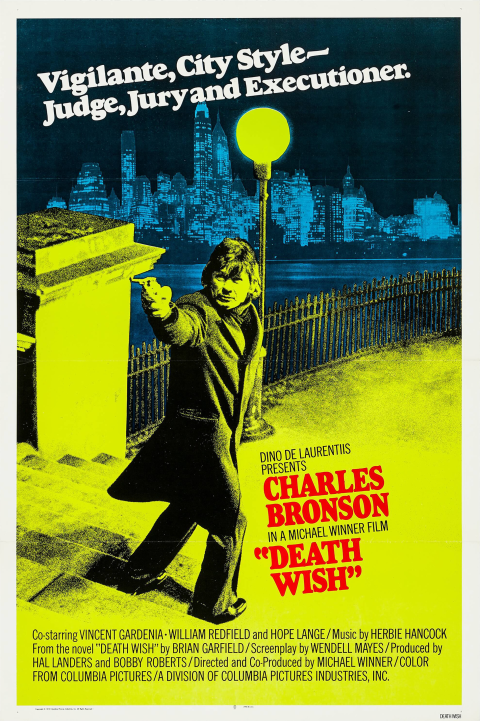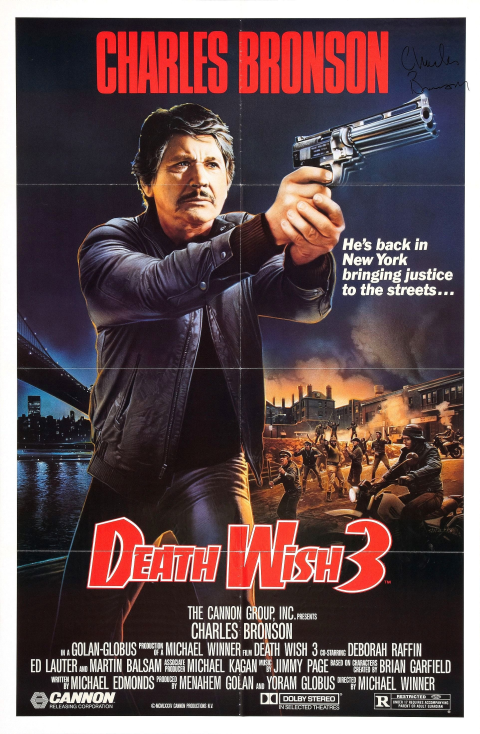You might look at these two movies and say that they’re similar, and you’d be right, but they are definitely not the same.
Much like the stories of another famous fictional vigilante (Batman), the Death Wish films exist on multiple gradient scales, namely serious to cartoonish, and feel-bad to feel-good (more like feel-alright, but you get the point).
Amazingly though, these two divergent examples have the same director (a real John Glen, if you will).
Let’s get to it.

Directed by Michael Winner
Written by Wendell Mayes, based on the novel by Brian Garfield
Cast: Charles Bronson, Hope Lange, Vincent Gardenia, William Redfield, Steven Keats, Stuart Margolin, Stephen Elliott, Kathleen Tolan, Jeff Goldblum, Christopher Guest, Olympia Dukakis, Paul Dooley
Soundtrack: Herbie Hancock
In contrast to the set-piece driven action films that would become the hallmark of the vigilante sub-genre, 1974’s Death Wish is much more of a bona fide drama, with interesting story choices and at least a modicum of depth to its main character (I think “protagonist” is a bit of a stretch).
Paul Kersey (Charles Bronson) doesn’t even shoot anybody until nearly halfway through the film, and it’s a literal journey to get there: we start in Hawaii, with he and his wife on vacation; then they come back to the concrete jungle of New York; wife and daughter are assaulted by hoodlums (one played by Jeff Goldblum); wife dies, daughter is mentally destroyed; then Kersey goes to Arizona on a job and the client takes him to a gun club, where we learn one or two things about Paul; then he comes back to New York again and starts killing muggers, and the police investigate.
The point is though, we see Kersey’s transition from mild-mannered architect to cold-blooded assassin of the night, and it is unvarnished, if not downright ugly. People often criticize this movie as some sort of right-wing jingoistic manifesto, but I think the truth is a little more complicated. Death Wish asks you to understand Paul Kersey (if it even asks that much), not necessarily agree with him (that’s up to you). Maybe it’s just me, but whatever “fun” entertainment value the movie has comes much more from the police chasing the vigilante (especially Vincent Gardenia) than from the vigilante himself.
I should also mention that Death Wish, while a smaller scale movie, is decidedly a picture from a major studio. Not a huge budget, but on par with other comparable productions. For one thing, its New York City is all real (and in winter; rough), and there’s some production design (fake advertisements and such) that a shoot with less backing might find difficult to implement.
If I have one particular criticism, and I hate to disparage a dead man, but Steven Keats’ performance as Kersey’s son-in-law sticks out like a sore thumb. I’ll cut him some slack because I imagine it’s what the director wanted, but it takes me out of the movie every time.
All-in-all, Death Wish is probably more influential than actually great, and it’s certainly of its time, but it’s still a solid watch, and not without some remaining resonance today (sadly).
Rating: ★★★½ (out of five)

Directed by Michael Winner
Written by Don Jakoby, based on characters created by Brian Garfield
Cast: Charles Bronson, Deborah Raffin, Ed Lauter, Martin Balsam, Gavan O’Herlihy, Kirk Taylor, Alex Winter, Ricco Ross, Joe Gonzalez, Marina Sirtis, Barbie Wilde, Billy J. Mitchell, Manning Redwood
Soundtrack: Jimmy Page
After the feel-bad opus of Death Wish II (Want to feel just awful? Put that one on), director Michael Winner finally decided to lighten things up.
The result is 1985’s Death Wish 3.
At a time when vigilante films were already becoming live-action cartoons (Vigilante, Exterminator 2), Winner pushed the envelope even further, creating one of the ultimate “turn your brain off” action movies of the decade. Unfortunately, there’s still some of his signature sadism left in (Marina Sirtis is rightfully still bitter about it), but, compared to the previous entry, it’s downright breezy.
It’s also far more unambiguous in its storytelling than the first one: Paul Kersey comes back to New York from exile in Los Angeles; his friend Charlie gets confronted by some thugs (one played by Alex Winter) while Paul is literally on his way to visit Charlie, and so Charlie dies in Paul’s arms; Paul gets taken into police custody, but then turned loose by the police chief who knows who he is and wants him to do what he does; and before too long (end of the first act), Kersey has gone to war with the local [inexplicably multi-racial] gang.
In more contrast to the original, Death Wish 3 is (adjusted for inflation) a much cheaper movie. There’s enough actual New York City to make it plausible, but it was largely shot in London to save on costs, and thus the cast is filled with American expats (if not downright UK citizens).
Not that it matters, because while there are some minor twists and turns in the story, the most important aspect of the film is that the last fifteen minutes devolves into glorious chaos, punctuated by the fact that our protagonist is a sexagenarian.
Not the same quality as its predecessor, but entertaining in its own right.
Rating: ★★★½ (out of five)
There you have it. Two Death Wishes: one bad-good, one good-bad. And Bronson might be even more charming in the latter…


